 W
WAn Army of Davids: How Markets and Technology Empower Ordinary People to Beat Big Media, Big Government, and Other Goliaths is a non-fiction book by Glenn Reynolds, a law professor at the University of Tennessee also known as the blogger 'Instapundit'. The book looks at modern American society through the lens of individuals versus social institutions, and Reynolds concludes that technological change has allowed more freedom of action for people in contrast to the 'big' establishment organizations that used to function as gatekeepers. Thus, he argues that the balance of power between individuals and institutions is "flatting out", which involves numerous decentralized networks rising up. Nelson Current, an arm of Thomas Nelson, Inc., published the book on March 7, 2006.
 W
WBeyond the First Amendment: The Politics of Free Speech and Pluralism is a book about freedom of speech and the First Amendment to the United States Constitution, written by author Samuel Peter Nelson. It was published by Johns Hopkins University Press in 2005. In it, Nelson discusses how the more general notion of free speech differs from that specifically applied to the First Amendment in American law.
 W
WBroad Band: The Untold Story of the Women Who Made the Internet is a nonfiction book by Claire L. Evans published in 2018 by Penguin Putnam Inc.. The magazine Inc. named it one of the ten top business books of 2018.
 W
WThe Canadian Internet Handbook was a series of non-fiction books written by Jim Carroll and Rick Broadhead first published in March 1994 aimed at an audience new to computers, describing the basics of how to use the Internet. Books contained information on what the Internet is, how to get connected, how it works, as well as a directory of internet-based services.
 W
WCaptive Audience: The Telecom Industry and Monopoly Power in the New Gilded Age is an American non-fiction book by the legal expert Susan P. Crawford. It describes high-speed internet access in the United States as essential but currently too slow and too expensive. To enable widespread quality of life and to ensure national competitiveness "most Americans should have access to reasonably priced 1-Gb symmetric fiber-to-the-home networks." Crawford explains why the United States should revise national policy to increase competition in a market currently dominated by Comcast, Verizon Communications, AT&T, and Time Warner Cable. Meanwhile, towns and cities should consider setting up local networks after the example of pioneers such as Lafayette, Louisiana's LUSFiber and Chattanooga, Tennessee's EPB.
 W
WClick Here to Kill Everybody: Security and Survival in a Hyper-connected World is a 2018 nonfiction book by Bruce Schneier that explores the risks and security implications of the proliferation of Internet of Things devices and increases in widespread automation, and lays out suggestions as to how these might be best mitigated at a societal level.
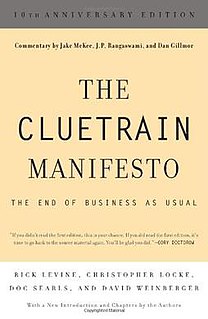 W
WThe Cluetrain Manifesto is a work of business literature collaboratively authored by Rick Levine, Christopher Locke, Doc Searls, and David Weinberger. It was first posted to the web in 1999 as a set of ninety-five theses, and was published as a book in 2000 with the theses extended by seven essays. The work examines the impact of the Internet on marketing, claiming that conventional marketing techniques are rendered obsolete by the online "conversations" that consumers have and that companies need to join.
 W
WCode and Other Laws of Cyberspace is a 1999 book by Lawrence Lessig on the structure and nature of regulation of the Internet.
 W
WCode: Version 2.0 is a 2006 book by Harvard law professor Lawrence Lessig which proposes that governments have broad regulatory powers over the Internet. The book is released under a Creative Commons license, CC BY-SA 2.5.
 W
WCognitive Surplus: How Technology Makes Consumers into Collaborators is a 2010 non-fiction book by Clay Shirky, originally published in with the subtitle "Creativity and Generosity in a Connected Age". The book is an indirect sequel to Shirky's Here Comes Everybody, which covered the impact of social media. Cognitive Surplus focuses on describing the free time that individuals have to engage with collaborative activities within new media. Shirky's text searches to prove that global transformation can come from individuals committing their time to active engagement with technology. Overall response has been mixed with some critics praising Shirky's insights but also decrying some of the shortcomings of his theory.
 W
WConsent of the Networked: The Worldwide Struggle for Internet Freedom is a book written by Rebecca MacKinnon and released in 2012. It discusses internet censorship and the ways in which companies which manage internet communication are assuming responsibilities formerly held by governments.
 W
WThe Cult of the Amateur: How Today's Internet Is Killing Our Culture (ISBN 978-0-385-52080-5) is a 2007 book written by entrepreneur and Internet critic Andrew Keen. Published by Currency, Keen's first book is a critique of the enthusiasm surrounding user-generated content, peer production, and other Web 2.0–related phenomena.
 W
WCyber Rights: Defending Free Speech in the Digital Age is a non-fiction book about cyberlaw, written by free speech lawyer Mike Godwin. It was first published in 1998 by Times Books. It was republished in 2003 as a revised edition by The MIT Press. Godwin graduated from the University of Texas School of Law in 1990 and was the first staff counsel for the Electronic Frontier Foundation. Written with a first-person perspective, Cyber Rights offers a background in the legal issues and history pertaining to free speech on the Internet. It documents the author's experiences in defending free speech online, and puts forth the thesis that "the remedy for the abuse of free speech is more speech". Godwin emphasizes that decisions made about the expression of ideas on the Internet affect freedom of speech in other media as well, as granted by the First Amendment to the United States Constitution.
 W
WThe Dark Net: Inside the Digital Underworld is a 2014 nonfiction book by Jamie Bartlett. It is published in the United Kingdom by Heinemann, in the United States by Melville House Publishers, and in Australia by Random House. Bartlett discusses online communities away from the mainstream, including those on Tor and the Deep Web. It discusses the darknet and dark web in broad terms, describing a range of underground and emergent subcultures, including social media racists, cam girls, self harm communities, darknet drug markets, cryptoanarchists and transhumanists.
 W
WDesigning Virtual Worlds is a book about the practice of virtual world development by Richard Bartle. It has been noted as an authoritative source regarding the history of world-based online games. College courses have been taught using it.
 W
WDril Official "Mr. Ten Years" Anniversary Collection is the first book by dril, a pseudonymous Twitter user known for his absurdist humor. The book is the author's compilation of the account's best tweets from its first ten years, alongside new original illustrations. The tweets are sorted into sections by topic. The book was self-published in paperback and ebook formats. According to the preface, dril published the book in print so that his tweets would survive a future societal collapse and digital dark age.
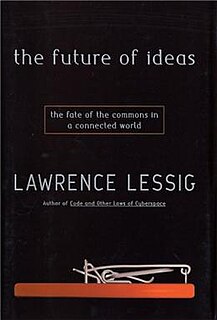 W
WThe Future of Ideas: The Fate of the Commons in a Connected World (2001) is a book by Lawrence Lessig, at the time of writing a professor of law at Stanford Law School, who is well known as a critic of the extension of the copyright term in US. It is a continuation of his previous book Code and Other Laws of Cyberspace, which is about how computer programs can restrict freedom of ideas in cyberspace.
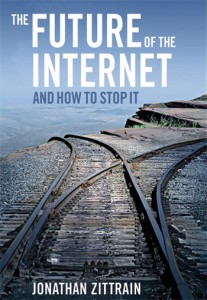 W
WThe Future of the Internet and How to Stop It is a book published in 2008 by Yale University Press and authored by Jonathan Zittrain. The book discusses several legal issues regarding the Internet.
 W
WGroundswell is a book by Forrester Research executives Charlene Li and Josh Bernoff that focuses on how companies can take advantage of emerging social technologies. It was published in 2008 by Harvard Business Press. A revised edition was published in 2011.
 W
WHow Music Got Free: The End of an Industry, the Turn of the Century, and the Patient Zero of Piracy is a non-fiction book by journalist Stephen Witt. The book chronicles the invention of the MP3 format for audio information, detailing the efforts by researchers such as Karlheinz Brandenburg, Bernhard Grill and Harald Popp to analyze human hearing and successfully compress songs in a form that can be easily transmitted. Witt also documents the rise of the warez scene and spread of copyright-infringing efforts online while detailing the campaigns by music industry executives such as Doug Morris to adapt to changing technology.
 W
WIdea Man: A Memoir by the Cofounder of Microsoft (2011) is the New York Times bestselling memoir by Microsoft cofounder Paul Allen. Published in 2011 by Portfolio, a Penguin Group imprint, the book recounts how Allen became enamored with computers at an early age, conceived the idea for Microsoft, recruited his friend Bill Gates to join him, and launched what would become the world's most successful software company.
 W
WThe Innovators: How a Group of Hackers, Geniuses, and Geeks Created the Digital Revolution is an overview of the history of computer science and the Digital Revolution. It was written by Walter Isaacson, and published in 2014 by Simon & Schuster.
 W
WInternet and Technology Law Desk Reference is a non-fiction book about information technology law, written by Michael Dennis Scott. The book uses wording from legal cases to define information technology jargon, and gives citations to individual lawsuits. Scott received his B.S. degree from Massachusetts Institute of Technology and graduated with a J.D. from the University of California, Los Angeles. He has taught as a law professor at Southwestern Law School. The book was published by Aspen Law and Business in 1999. Multiple subsequent editions were published under the imprint Aspen Publishers. Internet and Technology Law Desk Reference was recommended by the Cyberlaw Research Resources Guide at the James E. Rogers College of Law, and has been used as a reference in law journals including University of Pennsylvania Journal of International Economic Law, and Berkeley Technology Law Journal.
 W
WThe Internet Galaxy: Reflections on the Internet, Business, and Society is a book by Manuel Castells, Professor of Sociology and Professor of City and Regional Planning at the University of California. It was published by Oxford University Press in 2001. The title is a reference to The Gutenberg Galaxy, a 1962 book by Marshall McLuhan. It is regarded as a good introduction to Social informatics.
 W
WThe Internet of Garbage is a 2015 non-fiction book by journalist and lawyer Sarah Jeong. It discusses online harassment as a threat to the useful functions of the internet, and argues for new approaches to managing the issue. The book was reissued in 2018 with a new preface by Jeong.
 W
WIs Google Making Us Stupid? What the Internet Is Doing to Our Brains! is a magazine article by technology writer Nicholas G. Carr, and is highly critical of the Internet's effect on cognition. It was published in the July/August 2008 edition of The Atlantic magazine as a six-page cover story. Carr's main argument is that the Internet might have detrimental effects on cognition that diminish the capacity for concentration and contemplation. Despite the title, the article is not specifically targeted at Google, but more at the cognitive impact of the Internet and World Wide Web. Carr expanded his argument in The Shallows: What the Internet Is Doing to Our Brains, a book published by W. W. Norton in June 2010.
 W
WIt Came From Something Awful: How a Toxic Troll Army Accidentally Memed Donald Trump into Office is a 2019 book by Dale Beran, focusing on the intersection of Internet culture, alt-right, and Donald Trump's presidency.
 W
WKill All Normies: Online Culture Wars from 4chan and Tumblr to Trump and the Alt-Right is a 2017 non-fiction book by Angela Nagle published by Zero Books. It focuses on the development of internet culture, the nature of political correctness, the far-right and the election of Donald Trump. Nagle offers a left-wing critique of contemporary liberalism and its role in the creation of the alt-right movement in reaction.
 W
WNaked Conversations: How Blogs Are Changing the Way Businesses Talk with Customers (ISBN 978-0-471-74719-2), is a book written by Robert Scoble and Shel Israel, published in 2006 by John Wiley & Sons. The book is about how blogs, bloggers and the blogosphere is changing how businesses communicate with their consumers and other stakeholders. The authors discuss more than 50 case studies of companies and business leaders, some that have been helped and hurt by their interactions with bloggers and encourages businesses about the best and most successful ways of blogging.
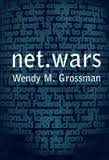 W
WNet.wars is a non-fiction book by journalist Wendy M. Grossman about conflict and controversy among stakeholders on the Internet. It was published by NYU Press in 1997, and was simultaneously made available free as an online version. The book discusses conflicts which arose during the growth of the Internet from 1993 through 1997, labeled by Grossman as "boundary disputes". These disputes deal with issues including privacy, encryption, copyright, censorship, sex, and pornography. The author discusses history of organizations in their attempts to enforce their intellectual property on the Internet, against individuals who attempted to reveal confidential materials asserting it was in the public interest. Grossman frames these disputes with respect to overarching rights of freedom of speech and the First Amendment to the United States Constitution.
 W
WThe People's Platform: Taking Back Power and Culture in the Digital Age is a 2014 book by Astra Taylor. Its central argument "challenges the notion that the Internet has brought us into an age of cultural democracy." The book was the winner of the American Book Award and has been praised by The Boston Globe, Flavorwire, and NY1 News' The Book Reader.
 W
WReading the Comments: Likers, Haters, and Manipulators at the Bottom of the Web is a 2015 non-fiction book by Northeastern University professor Joseph M. Reagle Jr.. The book was first published on April 24, 2015 through MIT Press and deals with the subject of Internet comments in locations like YouTube, Amazon, and forums.
 W
WThe Red Web: The Struggle Between Russia's Digital Dictators and the New Online Revolutionaries (2015) is a non-fiction English-language book by Russian journalists Andrei Soldatov and Irina Borogan which examines the history of surveillance technologies in Russia from the beginnings of the internet to the Internet age.
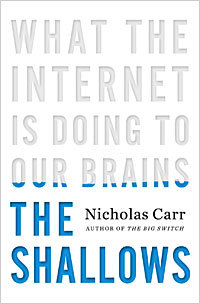 W
WThe Shallows: What the Internet Is Doing to Our Brains, published in the United Kingdom as The Shallows: How the Internet Is Changing the Way We Think, Read and Remember, is a 2010 book by the American journalist Nicholas G. Carr. The book expands on the themes first raised in "Is Google Making Us Stupid?", Carr's 2008 essay in The Atlantic, and explores the effects of the Internet on the brain. The book claims research shows "online reading" yields lower comprehension than reading a printed page. The Shallows was a finalist for the 2011 Pulitzer Prize in General Nonfiction.
 W
WSilicon Snake Oil: Second Thoughts on the Information Highway is a 1995 book written by Clifford Stoll where he discusses his ambivalence regarding the future of how the internet will be used. He wrote the book at a time when he felt the promise of the internet was being over-hyped: "I'm mainly speaking to people who feel mystically lured to the Internet: lotus-eaters, beware. Life in the real world is far more interesting, far more important, far richer, than anything you'll ever find on a computer screen." Stoll later acknowledged that the book was a mistake.
 W
WSo You've Been Publicly Shamed is a 2015 book by British journalist Jon Ronson about online shaming and its historical antecedents. The book explores the re-emergence of public shaming as an Internet phenomenon, particularly on Twitter. As a state-sanctioned punishment, public shaming was popular in Colonial America. Between 1837 in the UK and 1839 in the US, it was phased out as a punishment, not due to the increasingly populous society, as was widely held, but instead in response to rising calls for compassion.
 W
WToo Big to Know: Rethinking Knowledge Now That the Facts Aren't the Facts, Experts Are Everywhere, and the Smartest Person in the Room Is the Room is a non-fiction book by the American technology writer David Weinberger published in 2012 by Basic Books.
 W
WTwitter and Tear Gas: The Power and Fragility of Networked Protest is a 2017 non-fiction book written by Zeynep Tufekci about protest in the age of the internet, social networks, and social media. Tufekci describes the internet as a new type of digital public sphere and compares protest movements throughout history to modern movements that used the internet. The book is freely available under a Creative Commons license.
 W
WTwitter Power: How to Dominate Your Market One Tweet at a Time is a book about Twitter by Joel Comm published in 2009. It introduces readers to Twitter, explaining how to create a Twitter account, market their brands, and gain Twitter followers.
 W
WThe Victorian Internet: The Remarkable Story of the Telegraph and the Nineteenth Century's On-Line Pioneers is a 1998 book by Tom Standage. The book was first published in September 1998 through Walker & Company and discusses the development and uses of the electric telegraph during the second half of the 19th century and some of the similarities the telegraph shared with the Internet of the late 20th century.
 W
WWho Controls the Internet? Illusions of a Borderless World is a 2006 book by Jack Goldsmith and Tim Wu that offers an assessment of the struggle to control the Internet. Starting with a discussion of the early vision of a borderless global community, the authors present some of the most prominent individuals, ideas and movements that have played key roles in developing the Internet. As law professors at Harvard and Columbia, respectively, Goldsmith and Wu assert the important role of government in maintaining Internet law and order while debunking the claims of techno-utopianism that have been espoused by theorists such as Thomas Friedman.
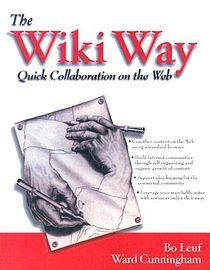 W
WThe Wiki Way: Quick Collaboration on the Web is a 2001 book about wikis by Bo Leuf and Ward Cunningham. It was the first major book published about using wikis. Cunningham invented wikis when he wrote WikiWikiWeb, the first wiki website software.
 W
WWired for Thought: How the Brain is Shaping the Future of the Internet is a book by entrepreneur Jeffrey Stibel that argues that the human brain and the Internet are similar and suggests that the Internet is further evolving into a brain. Besides his focus on the science and technology behind this evolution, the author also discusses its effects on Internet companies. The book was published by Harvard University Press in 2009.